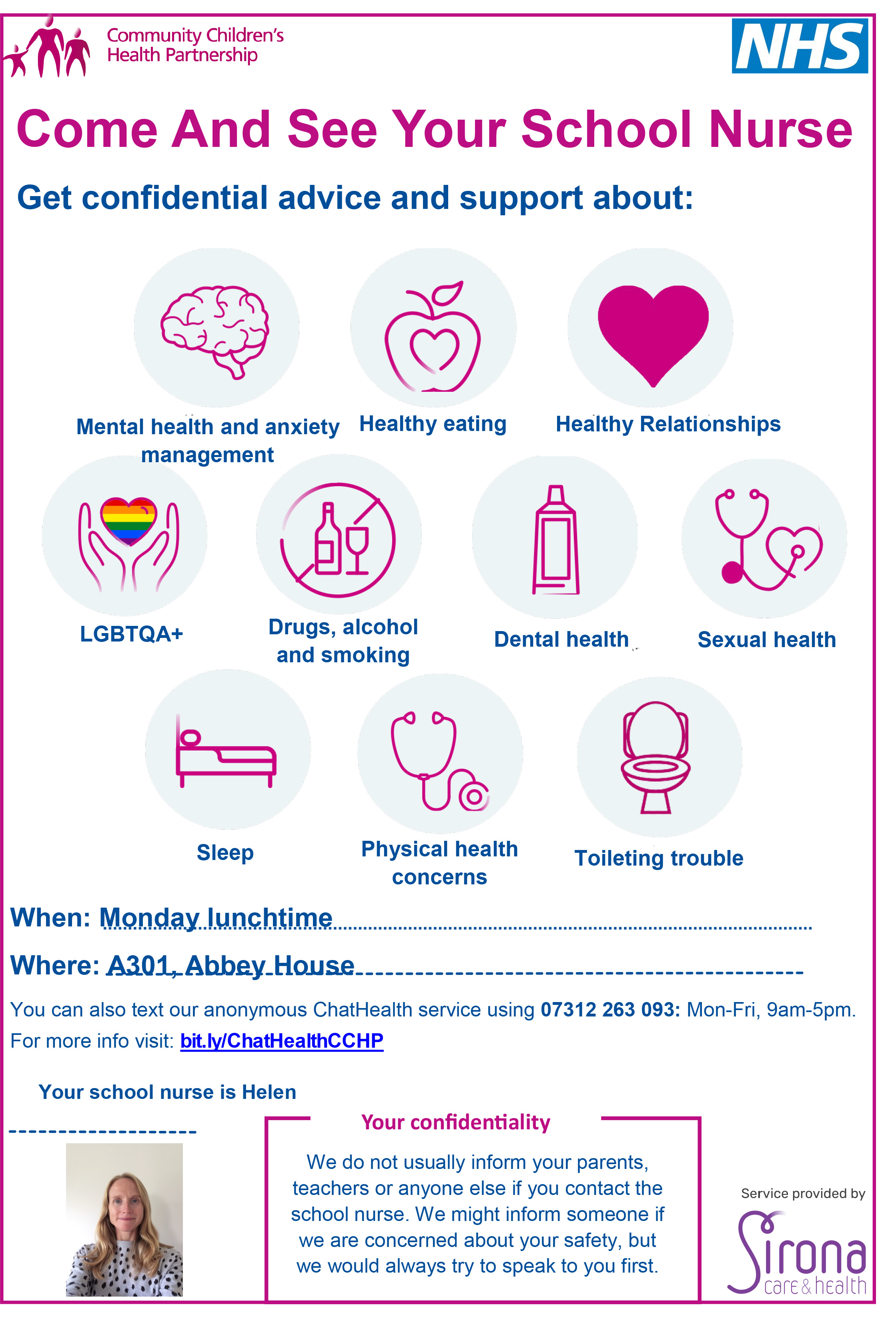Mental Health
We understand the challenges young people may face, and we are committed learning more about mental health in order to foster a nurturing environment. Our school community actively promotes mental health awareness, resilience-building, and open dialogue around mental health along side the promotion of staff 'mental health champions’ who are always here to talk. We strive to create a supportive atmosphere where students feel heard, understood, and empowered to prioritise their mental health alongside their academic pursuits. Together, we are fostering a culture that values mental wellbeing as an integral part of our students' success and happiness.
We all have mental health, like we all have physical health and as with physical health there will be times in our lives when our mental health needs looking after.
With good mental health, we can think positively, feel confident, act calmly, learn and reach our full potential. We can also express a range of emotions and cope with the normal stresses of life.
Poor mental health means we struggle to do these things. 1 in 10 children and young people will experience a mental health problem before the age of 16. That’s three students in an average-sized class. 1 in 4 adults will experience a mental health problem in any year. Even if a young person doesn’t experience mental health problems directly, the statistics above suggest they are likely to know someone who is affected. We must all take our mental health seriously and develop strategies to support ourselves and others when it is less than ideal.
At BCCS we believe that a child’s emotional health and wellbeing influences their cognitive development and learning, as well as their physical and social health and their wellbeing into adulthood. By supporting and teaching skills to pupils and staff to increase their awareness of emotional health and wellbeing we hope that we can reduce the number of students who are impacted, now and in later life.
Staff Mental Health Champions
We now have a number of staff trained through the Place2be (CPD-certified) Mental Health Champions programme. This is an award-winning online children’s mental health training course. The programme aims to:
- enhance professionals’ understanding of children’s mental health
- introduce approaches that foster positive wellbeing
The aim of the voluntary training is to increase visibility of staff who are comfortable, confident and trained in conversation around mental health. Staff members who have completed the course wear a green ribbon pin badge on their lanyards. It is our hope that this will break down any barriers to communication around mental health. These staff members are warm and friendly members of the community who have the knowledge to signpost and support those to relevant services when needed.

Strategies for supporting your child
Finding tools to manage one's mental health can be a case of trial and error. Here is a collection of ideas for managing low mood and anxiety born out of collaboration by staff and Post -16 students.
Talking to your child about their mental health
Social Media
Social Media is often scrutinised as having a negative impact on children’s mental health. Children and young people are now growing up in a technology dominated world, and social media plays a major role in their social lives. This balanced guide focuses at both the positive and negative impacts that social media can bring to young people and their mental health. Below are some information sheets to support your understanding of social media and wellbeing.
Sadfishing is a relatively new term that has gained traction and is seen as a growing trend on social media. The danger is that real problems can be overlooked for individuals who are just attention seeking. So, should parents be worried? Why might children get involved in sadfishing? And what could it lead to? To find out more read the guide below.
Created by mental health and wellbeing expert Anna Bateman, the guide looks at the dangers around sadfishing and the impact it could have on young minds. As always, the guide also provides a number of useful tips for parents and carers to share with their children.
One of the most significant things for parents or young people is that they know they can come to talk to someone if they are worried – whether it is about themselves or someone else. Please do not hesitate to contact us if you feel that you or someone you know would benefit from support.
One way you can notify school is using Whisper our anonymous tool, this way you can support those around you and allow the school to be aware of any situations outside of school.
School Nurse
Our School nurse is Helen. She runs drop-in sessions run on Monday lunchtimes in Abbeyhouse. Students can speak to a school nurse and get confidential advice and support on many topics (see the poster below). You do not need to book to see the nurse, anyone can pop by to speak to a school nurse during the lunch time session.
Please note that most conversations will be confidential however if the school nurse believes a student to be at risk of harm they will inform the school safeguarding team who would in turn contact parents/ carers where appropriate.
If you or your child needs to speak to the school nurse and it is not a Monday, please call the team on 0300 1245816.
The Chat Health texting service is also available if you need to speak to a School Nurse but would prefer it not to be in person or if you wish to talk between the hours of 9-5pm Monday to Friday.
Parents and carers can also make referrals to the school nurse by calling the School Nurse Team on 0300 1245816.


